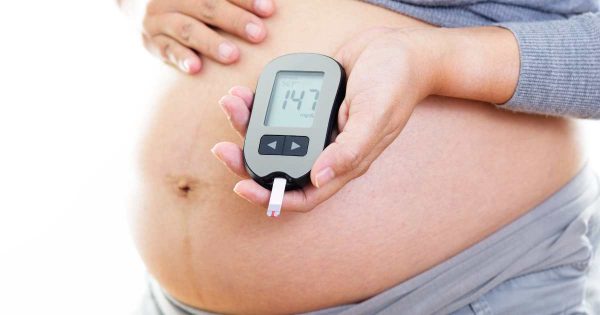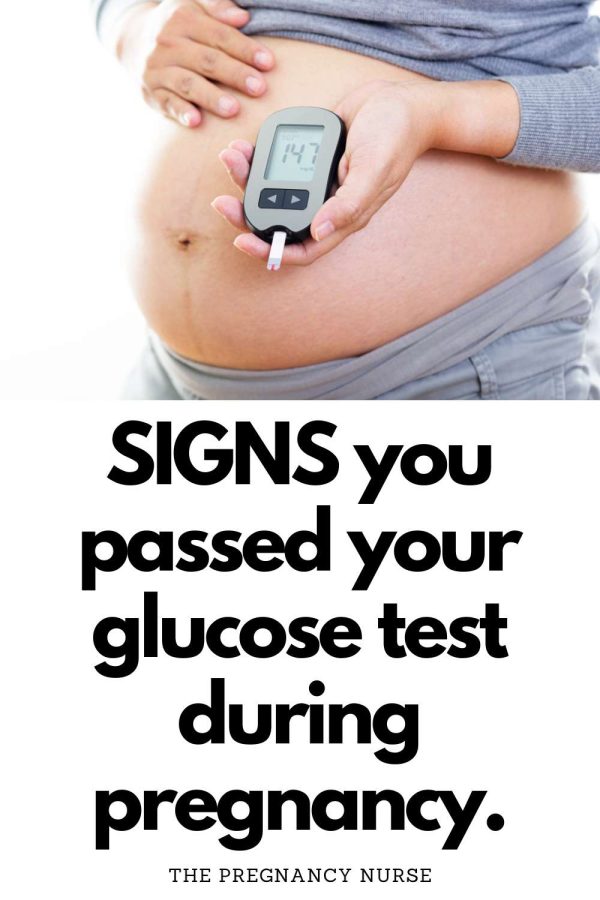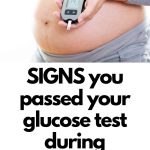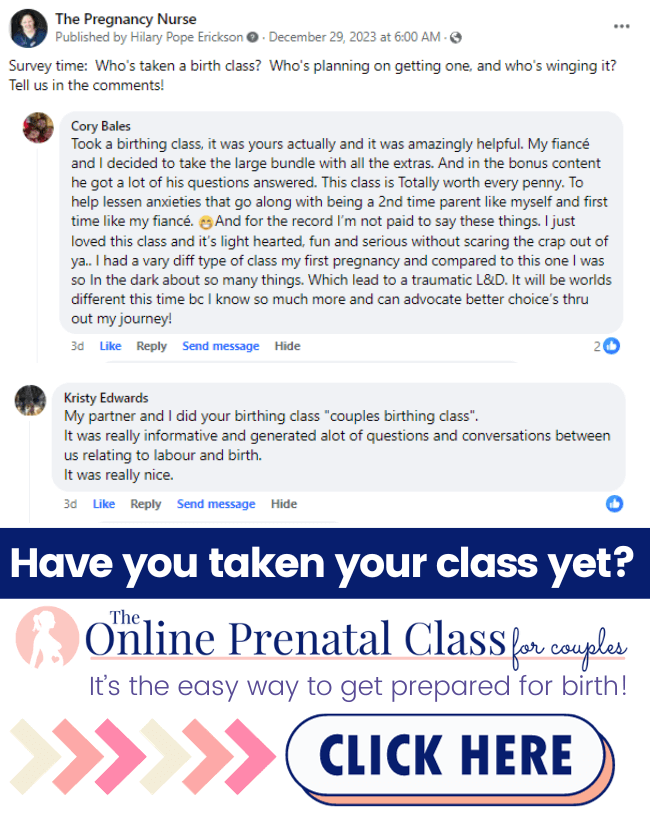So, you took your glucose test, and you’re anxious for the results? Can you TELL if you passed your test just because of how you feel afterwards? Not really — but it’s complicated — so keep reading.

But first, how do I know so much about the glucose test? Hi — I’m Hilary — The Pregnancy Nurse 👩⚕️. I have been a nurse since 1997 and I have 20 years of OB nursing experience, I am also the curly head behind Pulling Curls and The Online Prenatal Class for Couples. 🩺 I was diagnosed with glucose intolerance during my last pregnancy, I have worked in a gestational diabetes clinic and I’ve seen THOUSANDS of patients who’ve had GDM, so I’m a great resource here.
This is just a part of my series on The Pregnancy Glucose Test For Gestational Diabetes << be sure to read that post for ALL the info on that important test!
What is the best sign that you passed your glucose test during pregnancy?
You get a call from the doctor that your results are normal.
I know, I know — that’s not what you wanted to hear. And I’m sorry. I wish I had better ideas.
The sad news is that gestational diabetes can be a silent problem. Today we’re going to explore signs that you do or don’t have gestational diabetes, but I want to be VERY clear that for MOST people there aren’t signs.
Which is why people need to take the darn 1 hour glucose test. Yes, I know it’s horrible (seriously, I detest that thing, and the 3-hour test I hate even more) — but it’s so important for you and your baby’s health.
Does feeling crappy after your test mean you passed (or failed)?
No, most everyone feels pretty horrible after the tests (especially the 3 hour). If you’ve taken it recently make SURE that you’re eating a balanced diet to get your body back on track. Having all that sugar at once often makes people feel extra tired, out of sorts and even a bit pukey. So, be kind to yourself.
BTW, right when you take your glucose test is the PERFECT time to start getting prepared for birth. This is the easy way. People love that it can be stuffed into your regular life in 20-minute (or less) chunks). Great to eat dinner to!
What is Gestational Diabetes?
Gestational diabetes is a type of diabetes that occurs during pregnancy. It can cause high blood sugar levels in the mother and potentially lead to problems like preterm delivery, macrosomia (large baby), and low blood sugar in the newborn.
What kinds of problems can Gestational Diabetes cause?
Gestational diabetes can lead to some serious problems for the mother and baby. Women with gestational diabetes are more likely to deliver their babies preterm, have a large baby (macrosomia), and require interventions such as induction or cesarean section.
Babies born to mothers with gestational diabetes are also at risk of developing low blood sugar (hypoglycemia). Additionally, gestational diabetes can increase the mother’s risk of developing type 2 diabetes in the future.
Note: It’s not having gestational diabetes that causes you to have diabetes later on — it means your body is just more prone to it, and you’re more likely to have it because of that. The good news is that when you know you’re prone to it there are diet and lifestyle changes you can make for your benefit.
What are the symptoms of gestational diabetes?
The unfortunate truth is that there are often no symptoms of gestational diabetes. That’s why it’s so important to take the glucose screening test during pregnancy. The only way to know if you have gestational diabetes is by taking a blood sugar test and having high results. Some women may notice excessive thirst, frequent urination, nausea, or fatigue, but this is not the norm.
This is also why EVERY pregnant woman is encouraged to take the test — vs some things that we only test if you have symptoms or a family history.
One of the best ways to make sure that baby is doing well is to start your kick counts — grab my cheat sheet here to make sure you’re doing them right:
What should I do if I think I have gestational diabetes?
If you are concerned that you may have gestational diabetes, it’s important to talk to your doctor and find out about getting tested for the condition. Your doctor will most likely perform a glucose screening test as part of your prenatal care.
Depending on your results, they may refer you for a 3-hour glucose tolerance test to confirm the diagnosis.
What happens if I do have gestational diabetes?
Once you have been diagnosed with gestational diabetes, it is important to work closely with your health care provider and follow the recommended treatment plan. This typically includes monitoring blood sugar levels, adhering to an appropriate diet and exercise plan, and possibly taking medication to control blood sugar levels.
The good news about all of this, is that most people find that when they start eating per the gestational diabetes diet they feel a lot better. I actually think it’s a great way for all pregnant people to eat. I have a bonus nutritional video in here where we chat about it with one of my favorite nutritionsists.
Will I have diabetes forever?
No. Most women who have gestational diabetes will return to normal blood sugar levels after their pregnancy is over.
However, it’s important to get screened for type 2 diabetes 6-12 weeks after delivering your baby, to make sure that you don’t develop this condition in the future.
I think the general theory of thought is that we probably catch a decent number of people who are type 2 diabetic patients prior to their pregnancy. Then, they fail that glucose test and are diagnosed with gestational diabetes.
Because they were type 2 before, it continues after they have the baby — which is a good part of the reason they check you again a few weeks after baby is born.
However, they encourage you to go back to your previous pattern of eating after the placenta is out. Aka, one of my BFF’s brought me chocolate cake in the hospital after my #3 was out. It was delicious (and I felt fine afterwards).

How does the Glucose Test Work?
You arrive to the lab. Some doctors want you to fast prior to the test, although most often anymore you don’t need to arrive fasting. I have a whole post on what to eat before your gestational diabetes test.
If your doctor wants a fasting blood sugar, they will take a blood sample (if they don’t order, that you’ll just skip to the next step).
They will have you drink a very sweet glucose solution (I recommend to just drink it fast so you can get started). They will then check your blood glucose level (by a blood draw) 1 hour after you drink the solution. After they test that, they will know if you’re OK or if it was abnormal and you need to take the 3-hour test, or if it was high enough they are confident to diagnose gestational diabetes at that point.
During the test pregnant women should not eat or drink anything else.
Pro Tip: Make SURE to bring a snack with carbohydrates and proteins with you during this test. For me, my blood sugar always drops afterwards and I don’t feel too well. Making sure that I eat right after helps a lot (I usually bring a PB&J in my car and I just eat it as soon as I’m done).
I also have an article that gives tips to passing your glucose test and one on not failing the glucose test. Cliff notes: There isn’t much (but eating correctly beforehand can help).
The most important thing to be aware of in this article is that there are no particular signs of gestational diabetes. Yes, if people have wild blood sugar swings, or specific bad symptoms that CAN be a sign, but the VAST majority of people diagnosed with gestational diabetes have no idea that they had it. The good news is that you only really need to follow the diet recommendations for the remainder of your pregnancy
I have also heard (and felt myself) that after I followed the eating guidelines (matching my carbohydrates with proteins and making sure I ate a couple of snacks and smaller meals during the day) I felt MUCH better. So, that’s a win that just shifting my eating helped.
Even if you can’t imagine testing your blood sugar or changing how you eat, please still take the diabetes test so they can monitor you or your baby for any complications. It’s just so important.
If you’d love to know more important, and simple things you can do to have a safe and healthy pregnancy please do come join me in The Online Prenatal Class for Couples. We aim to prepare you from bump to bassinet in just three hours!
And, if you’re not quite sure you’re ready for that whole thing, check out my free prenatal class. It’s your first step toward getting in the driver’s seat of your birth. Plus I go over some other 3rd trimester tests that your doctor may be considering for you.








 What To Do About A Selfish Husband During Pregnancy?
What To Do About A Selfish Husband During Pregnancy?
